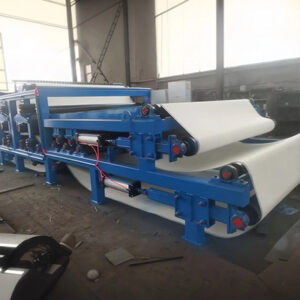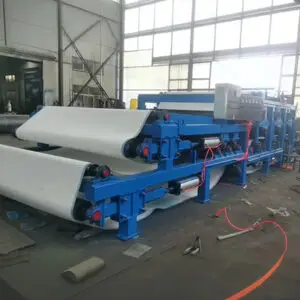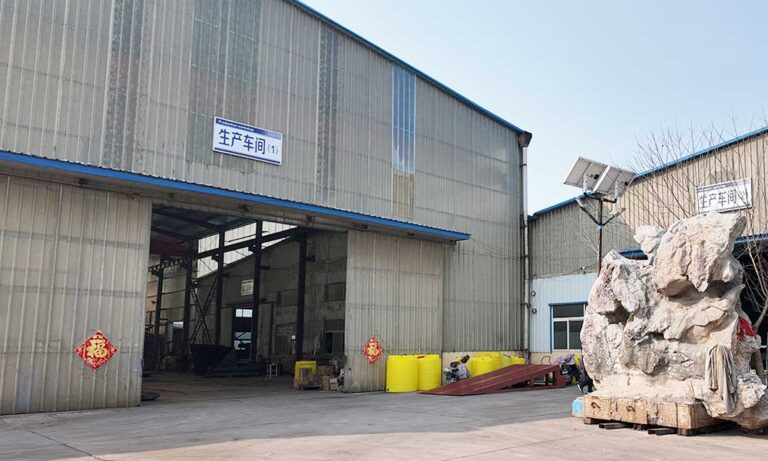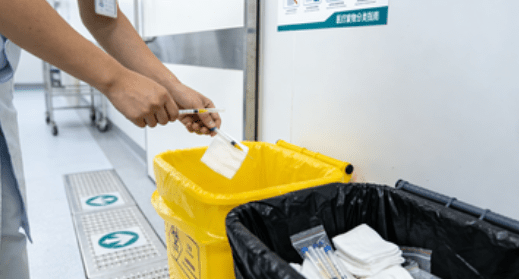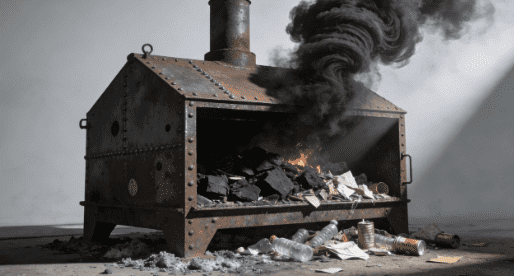Welcome to My Blog! 🌟
I’m so glad you’re here! Before we jump into the exciting content, I’d love for you to connect with me on my social media platforms. It’s where I share extra insights, interact with our amazing community, and post regular updates. Here’s how you can join the conversation:
📘 Facebook: Follow me on Facebook for more updates
Now, let’s dive into the journey ahead. I hope you find everything here both engaging and valuable. Together, let’s explore, learn, and grow! 🚀
Table of Contents
Introduction

As the world continues to face growing environmental challenges, the demand for effective waste management solutions has become more critical than ever. Wastewater treatment and sludge dewatering are essential processes in industrial and municipal waste management systems. Among the technologies that have made significant strides in sludge treatment is the sludge dewatering press, a crucial tool that enhances the efficiency of wastewater treatment plants. At Shandong Lushun Environmental Technology Co., Ltd., we offer high-quality equipment designed to provide efficient and reliable sludge dewatering solutions for various industries. In this blog, we will explore the benefits of using a sludge dewatering press and why it is a game-changer in waste management.
NO 1. Efficient Waste Reduction
One of the primary benefits of a sludge dewatering press is its ability to significantly reduce the volume of sludge produced during wastewater treatment. Sludge, which is often a byproduct of industrial, mining, and municipal wastewater processes, typically contains a high percentage of water. This high water content makes it bulkier, difficult to transport, and costly to dispose of. By removing the majority of the water, the dewatering process transforms the sludge into a more compact, manageable form.
In industrial sludge treatment or mining operations, such as those using Shandong Lushun‘s Mining Sludge Belt Filter Press, gravity filtration and pressure filtration techniques combine to achieve superior waste reduction. This not only reduces the overall volume of sludge but also improves overall treatment efficiency.
The result is a significant reduction in waste volume that can translate into cost savings, reduced transportation needs, and less impact on landfills. For instance, wastewater treatment plants can benefit from reduced operational costs as they handle less material and require fewer trips to dispose of the sludge.
Moreover, industries involved in mining, food processing, or municipal wastewater treatment can streamline their operations and manage waste disposal more efficiently. In fact, reducing the sludge volume is a crucial step in meeting regulatory compliance and sustainability goals.
At Shandong Lushun, we offer various models, such as the Mining Sludge Belt Filter Press, which utilizes gravity filtration and pressure filtration techniques to achieve superior waste reduction. This not only reduces the volume of sludge but also improves overall treatment efficiency.
NO 2. Cost-Effective Waste Disposal
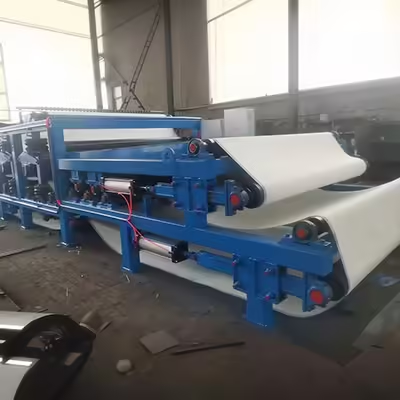
The reduction in sludge volume directly translates into lower disposal costs. Traditional methods of sludge disposal, like sending large amounts of wet sludge to landfills, can be expensive. The sludge dewatering press minimizes the volume of material that needs to be disposed of, thus reducing the associated transportation and disposal costs. The process results in a solid cake with low moisture content, making it easier and less costly to handle.
For example, our Industrial Sludge Belt Filter Press uses multi-stage rollers to squeeze out excess water, forming a low-moisture cake that reduces disposal costs significantly. Moreover, the reduced moisture content makes it easier for industries to recycle or repurpose the dewatered sludge, creating new opportunities for waste-to-value applications.
NO 3. Enhanced Environmental Impact
Using a sludge dewatering press also has significant environmental benefits. By reducing the volume of waste sent to landfills, the pressure on waste disposal systems is alleviated, contributing to a more sustainable waste management approach. Additionally, dewatered sludge is often repurposed in a variety of ways, such as soil conditioning in agriculture or energy generation through biogas production.
Shandong Lushun’s equipment, like the Mining Sludge Belt Filter Press, is designed with environmental sustainability in mind. The reduction of sludge volume and improved handling capacity ensures that businesses meet environmental standards while contributing to a circular economy. By reducing landfill use and promoting the recycling of dewatered sludge, industries can significantly decrease their carbon footprint.
NO 4. Improved Operational Efficiency
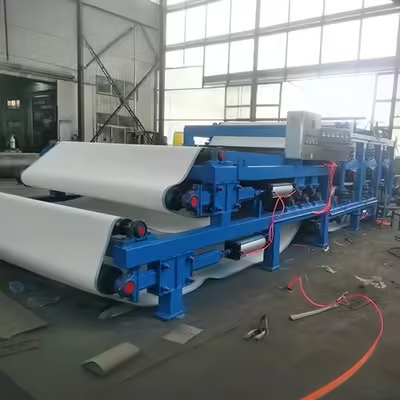
A key feature of the sludge dewatering press is its ability to improve the operational efficiency of wastewater treatment plants and other facilities. The advanced filtration and pressing technology ensure that sludge is efficiently processed, leaving behind a solid cake that is easy to handle and dispose of. The integration of multi-stage rollers and pressure gradients enhances the dewatering process, making it more efficient and reducing the overall treatment time.
The Industrial Sludge Belt Filter Press and other products from Shandong Lushun are designed for easy operation and minimal maintenance. This allows plants to run more efficiently, with less downtime, enabling better resource management. Furthermore, many of these machines are designed for automation, reducing the need for manual intervention and improving the overall efficiency of waste treatment systems.
Automating the sludge treatment process reduces the need for labor-intensive manual intervention and allows for continuous operation. This results in improved consistency in sludge processing, reduced energy consumption, and overall better management of treatment facilities. Additionally, by using a sludge dewatering press, plants can more effectively manage waste streams and improve their overall operational workflows.
NO 5. Versatile Applications Across Industries
The versatility of the sludge dewatering press is another reason why it is an invaluable tool in waste management. This equipment can be used across a wide range of industries, including mining, food processing, municipal wastewater treatment, and industrial sludge management. Whether it’s the Mining Sludge Belt Filter Press used in mining operations or the Desilting Sludge Belt Filter Press employed in municipal wastewater treatment, these machines are adaptable to different types of sludge and varying operational requirements.
Shandong Lushun’s belt filter press models are designed to handle different sludge types, offering flexible solutions for a wide range of applications. Whether you’re dealing with mining sludge, industrial sludge, or desilting sludge, the precise control over the dewatering process ensures optimal performance.
The machines are particularly valuable in industries like food processing and municipal wastewater treatment, where sludge characteristics may vary widely. In mining and industrial sludge applications, the dewatering press can handle tough sludge conditions and provide consistent results. This versatility makes the equipment suitable for small-scale and large-scale operations, helping businesses achieve cost-effective waste management across diverse sectors.
Table: Key Features of Shandong Lushun’s Sludge Dewatering Presses
-
Desilting Sludge Belt Filter Press
¥23,208.53 -
Industrial Sludge Belt Filter Press
¥37,023.13
| Feature | Mining Sludge Belt Filter Press | Desilting Sludge Belt Filter Press | Industrial Sludge Belt Filter Press |
|---|---|---|---|
| Dewatering Efficiency | High | High | High |
| Sludge Type | Mine Sludge | Desilting Sludge | Industrial Sludge |
| Filtration Method | Gravity and Pressure | Gravity and Pressure | Gravity and Pressure |
| Machine Weight | 9600kg | 8200kg | 8200kg |
| Dimensions (LWH) | 13000mm3500mm2600mm | 13000mm3000mm2600mm | 13000mm3000mm2600mm |
| Packaging Weight | 10000kg | 8600kg | 8600kg |
Conclusion
In conclusion, the sludge dewatering press offers numerous benefits to industries involved in wastewater treatment and sludge management. By significantly reducing waste volume, lowering disposal costs, improving operational efficiency, and contributing to a more sustainable environment, these machines are crucial tools in modern waste management. At Shandong Lushun Environmental Technology Co., Ltd., we provide high-quality, reliable sludge dewatering equipment that meets the diverse needs of industries worldwide. Whether you’re handling mining sludge, industrial sludge, or municipal wastewater, our sludge dewatering presses deliver exceptional performance and efficiency.
FAQ
What types of sludge can the sludge dewatering press handle?
The sludge dewatering press can handle a wide variety of sludge types, including mining sludge, industrial sludge, and desilting sludge. Different models are designed to cater to specific types of sludge, ensuring optimal performance.
How does a sludge dewatering press work?
A sludge dewatering press works by combining gravity filtration and pressure filtration. Initially, the sludge is dehydrated using gravity, and then a series of rollers apply pressure to further squeeze out water, resulting in a solid, low-moisture cake.
What are the environmental benefits of using a sludge dewatering press?
The environmental benefits include reduced sludge volume sent to landfills, which helps alleviate the strain on waste disposal systems. Additionally, the dewatered sludge can be repurposed for various applications, such as soil conditioning or biogas production, contributing to sustainability.
What maintenance is required for the sludge dewatering press?
Shandong Lushun’s sludge dewatering presses are designed for minimal maintenance. Most models feature automated processes that reduce the need for manual intervention, allowing operators to focus on monitoring and ensuring smooth operation.
Can I use the sludge dewatering press in my wastewater treatment facility?
Yes, our sludge dewatering presses are ideal for wastewater treatment plants, as they efficiently handle the dewatering of municipal, industrial, and mining sludges. These machines are adaptable to a wide range of operational needs.



